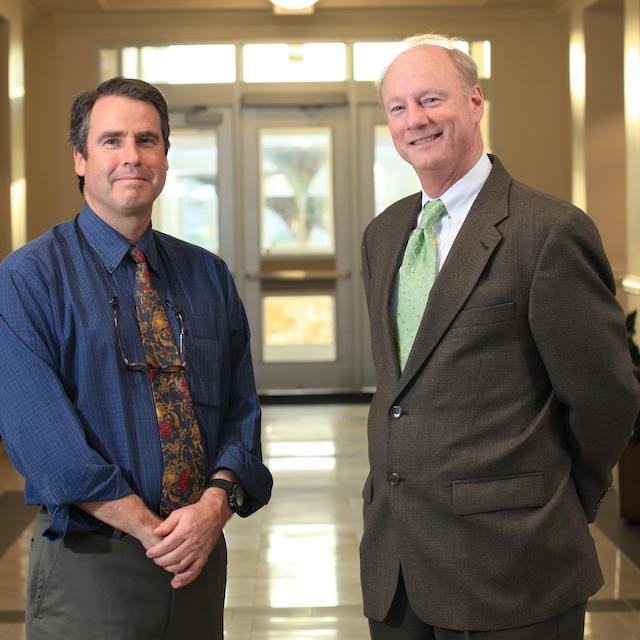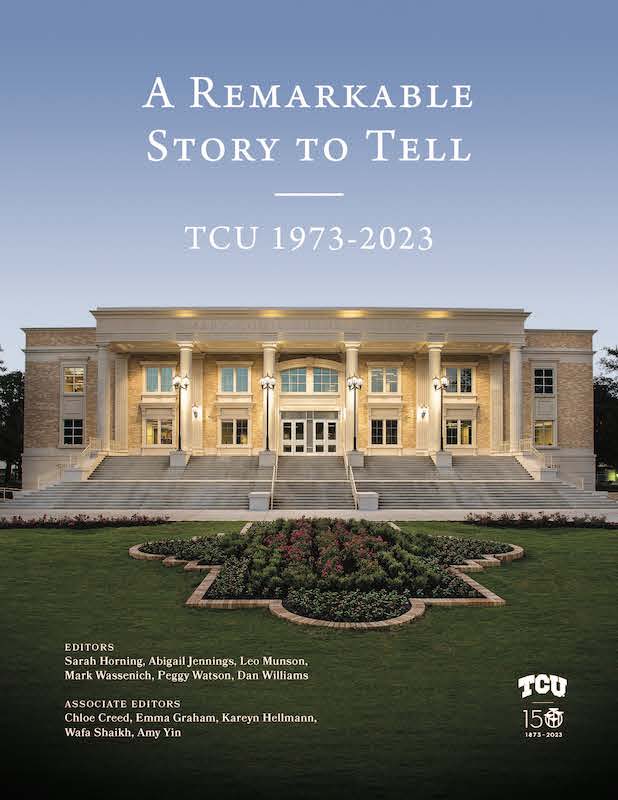
Final 150th Book Tells a Remarkable Story
Imagine brothers Addison and Randolph Clark returning to TCU and taking a guided tour of their beloved university, one that is now listed among the top 100 in the U.S.
“Remarkable” is likely the word they would exclaim again and again.
It’s also what Chancellor Victor Boschini, Jr. used in a 2006 convocation speech: “In these competitive and challenging times, we must be very good at what we do. …We must know — and clearly communicate — who we are and what we want to be. Simply put, TCU has a remarkable story to tell.”
 And so that story — of how a small, regional college aspired to be nationally recognized
university — is being told through TCU Press’ Sesquicentennial book, A Remarkable Story to Tell: TCU 1973-2023. It recounts the journey of the past 50 years to realize that very ambitious goal.
And so that story — of how a small, regional college aspired to be nationally recognized
university — is being told through TCU Press’ Sesquicentennial book, A Remarkable Story to Tell: TCU 1973-2023. It recounts the journey of the past 50 years to realize that very ambitious goal.
At the core of Remarkable is how visionary leaders – administrators, faculty, trustees, alumni and others in the TCU community – saw the university’s potential and shaped it to be the highly recognized and distinctive institution it is today. As they led, they maintained the values that the Clark brothers committed to: helping students develop as responsible citizens.
Dan Williams, director of the TCU Press and one of the book’s editors, noted that these values are a dominant theme.
“The people we interviewed talked about those so much,” he said. “We recognize that our university is about valued-centered experiences, but we don’t always know how to describe what those are and what they mean in life. This book is testimony of how those have been put into practical life.”
How the story is told also makes it remarkable. It’s a collection of the voices of more than 140 people interviewed as part of the TCU Oral History Project, the seeds of which were planted in 2010 when Williams and Leo Munson, then associate provost, talked about the progress TCU had made in the prior decade.
“We discussed that a lot of this progress began when Bill Tucker became chancellor in 1979 and that it would be nice to gather his and others’ stories,” he said.
The Oral History Project resulted between 2011 to 2018 with interviews conducted students in the John V. Roach Honors College.
“The idea was to piece different interview passages together to create a narrative of TCU’s progress,” Williams said. “Given the volume of material, this itself was something of a remarkable story.”
The idea of turning the oral stories into a book became clear with TCU’s 150th on the horizon. With 1,500 transcript pages — totaling more than 900,000 words — the project was daunting. After compiling the oral histories, it took nearly three years of “filtering.”
“It’s been a difficult book to put together but a wonderful experience,” Williams said. “All of us have grown quite close and enjoyed putting together hundreds of voices in this book. It’s been a privilege.”
The book begins with a chapter written by Don Mills, vice chancellor for Student Affairs emeritus, whose time at TCU began with its centennial and then spans the next 50 years of change.
“His deep knowledge of and love for TCU plus his experience in Student Affairs gave him unique insights,” Williams said.
In addition to a chapter dedicated to values, another focuses on leadership and vision, beginning with Tucker, followed by chancellors Michael Ferrari (1998-2003) and Boschini (2003-present).
Following a recap of these legacies are 22 thematic chapters, or spreads, ranging from academics to athletics to student life to the growth in facilities at TCU. In addition to Williams and Munson, the book’s editors include doctoral candidate Sarah Horning, Mark Wassenich ’64, doctor of letters, honoris causa; Peggy Watson, founding dean of the John V. Roach Honors College; and Abigail Jennings ’20, now production manager at TCU Press. Jennings’ first experience with the book was finding excerpts.
“We had a solid list of topics, but one that we hadn’t considered was culture,” she said. “That wasn’t something easy to ‘search’ but we found it over and over in different ways so we made a point of looking for those examples. It [culture] is something that has not changed over time.”
TCU’s culture began with the Clark brothers’ commitment to the students to develop as ethical and responsible citizens, Williams added.
“We have carried that through since 1873, in part because of the Disciples of Christ’s influence that everyone has a place at the table, that every voice should be recognized, that we have life of service to others,” he said. “Today, TCU not only offers an education to teach people but helps them look toward the future and how to live good lives responsibly.”
In its final chapter, Boschini concludes the book similarly.
“Thoughts on the Future, a Personal Reflection,” writing: “In terms of our mission and vision, I think that we will always be committed to helping students become responsible citizens and ethical leaders in the global community. This commitment has lasted 150 years, and it will last another 150 or more.”
Following TCU’s First 100 Years 1873-1973, A Remarkable Story to Tell: TCU 1973-2023 is the second and final volume celebrating TCU’s 150th anniversary. It available in limited quantities at the TCU Campus store and through TCU Press.
Learn about other 150th commemorative books including A Hope of Wisdom, A History to Remember: TCU in Purple, White, and Black, Images and Stories of TCU’s First 100 Years 1873-1973 and Walking TCU: A Historic Perspective.
